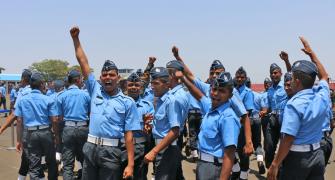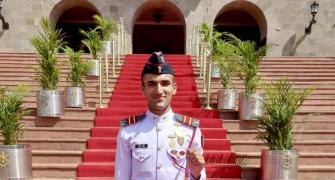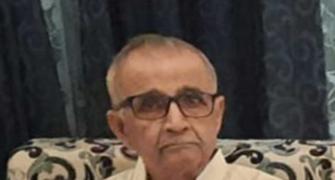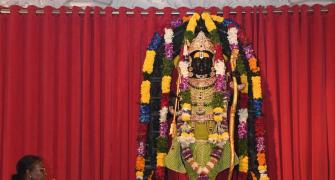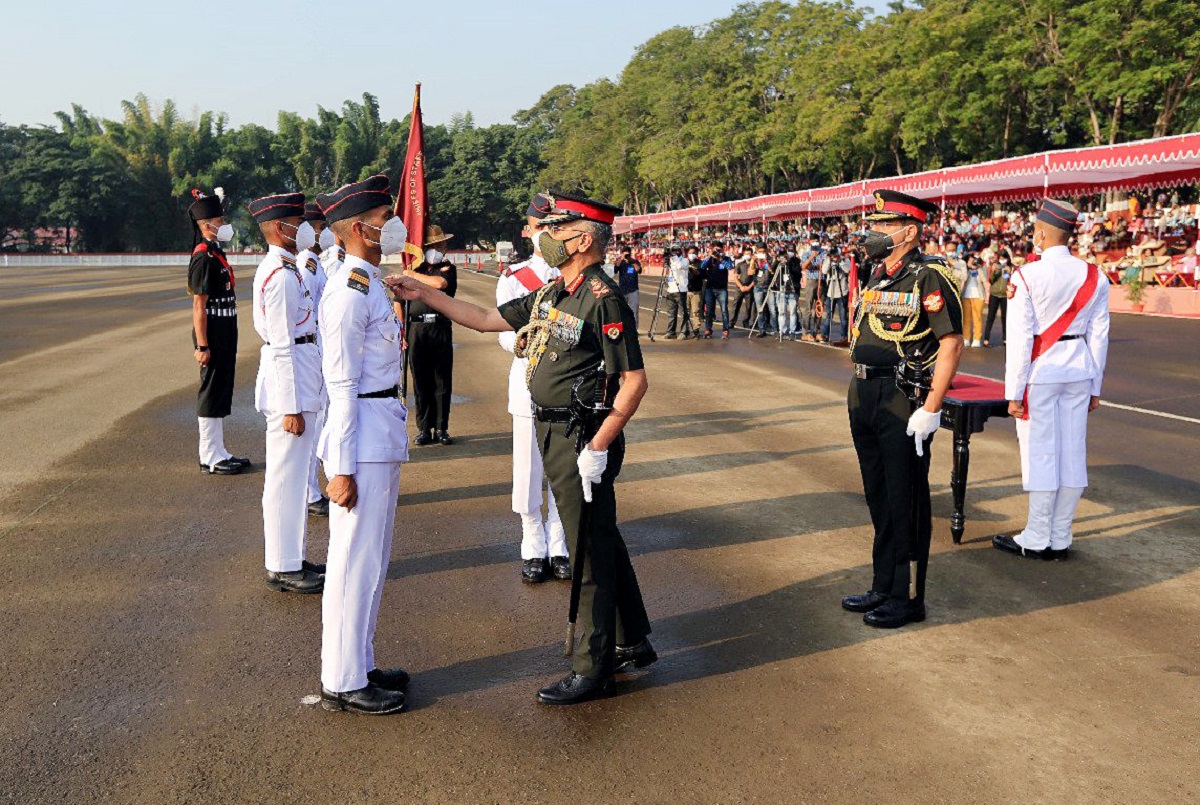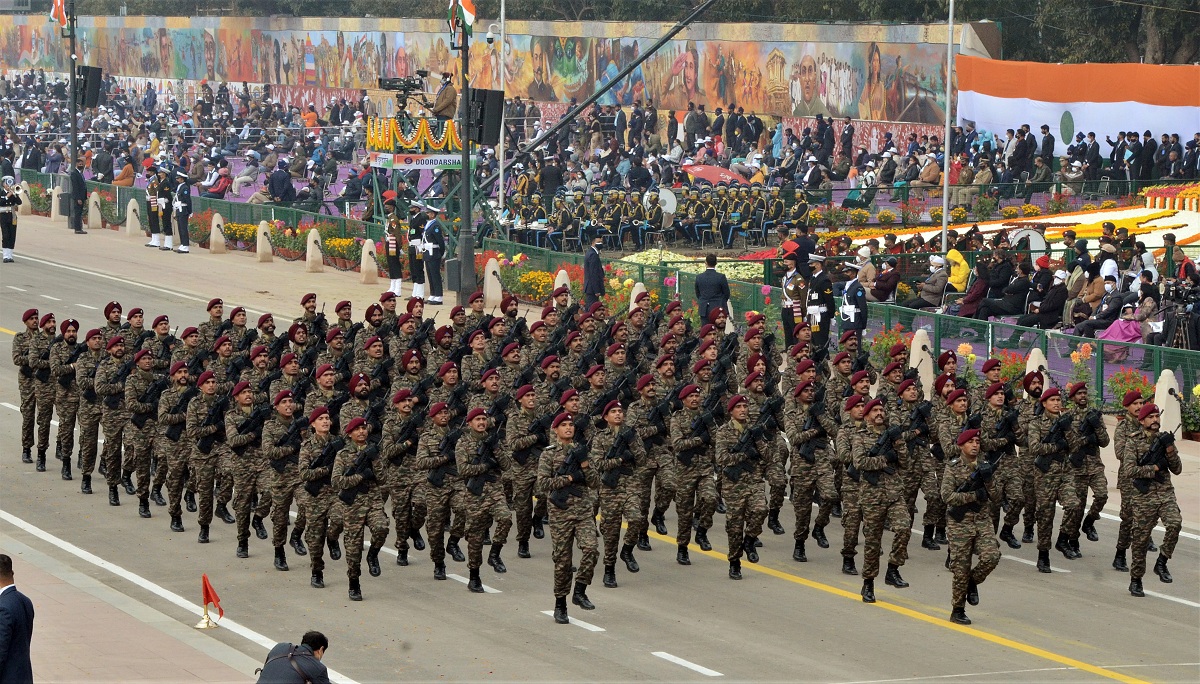All work in the armed forces is team work. One has to deal with people all the time -- at work, play and even during war, advises IAF Veteran Air Commodore Nitin Sathe.

Kindly note the image has been posted only for representational purposes.
Photograph: PTI Photo
The National Defence Academy, along with the other competitive exams for selection to the armed forces, are round the corner once again.
For NDA aspirants studying in Class 12, this will be their first attempt and I am sure they are putting in sincere efforts towards doing well.
NDA aspirants who are completing their college education must be preparing for the Combined Defence Services Examination, Air Force Common Admission Test and other such exams.
When asked for advice, I always tell young men and women to start their preparation for the exam as early as possible.
For those of you who are still in school, your groundwork must begin by Class 8 or Class 9; this will give you adequate time to prepare well.
If I were to join the Armed Forces again, I would follow the following steps. Try them out!
1. Start exercising regularly
It would be a good idea to get yourself examined at a hospital and see if you are medically fit as per the standards mentioned online for armed forces aspirants.
While there may be treatments available to resolve some of your medical issues (if you are facing any), there may be some irregularities or kinks in your body which may not allow you to join this profession.
Ascertain that you are good to go and then move on with the rest of the preparations.
Additionally, you also must pick up a game like football, hockey, volleyball, basketball or any other team game; it will also help you in more ways than just fitness.
2. Start reading
All kind of reading is beneficial, be it fiction, non-fiction, comics, newspapers or magazines.
It will help you improve your language skills, become more articulate and make you aware of what is happening around you.
This is an important requirement for the SSB interview.
Reading provides exercise to the brain, improves concentration, increases general knowledge, is motivational and reduces stress.
Also, make it point to include a general knowledge magazine/book like the competition success review a part of your everyday must-read list.
3. Start writing
In addition to reading, start writing.
Read an article/book or anything else and write a small paragraph on what you learnt from it in your own words.
Look at a picture for a few seconds and write a short story about what the picture makes you feel about what is happening and the situation could lead to.
Writing helps you improve your language skills and your memory; it also makes you more coherent.
Good articulation is a great skill to have at the SSB.
4. Develop a sense of curiosity
Encourage the inquisitive side of your personality.
Look at the things around you that help with your daily life. The fan, the fridge, the pressure cooker, your watch, car, cycle and things like that. How do they work?
You use them daily but never think about how they work.
It is a good idea to make a note of all that you learn about the science behind their working in a diary.
While this exercise will make you wiser and more aware of your surroundings, you will also notice a marked change in your confidence levels.

5. Make lots of friends
Friendships are an important part of personality development.
You begin to understand human relationships, understand that each person is different and has a different reaction to the same inputs.
It also makes you socially acceptable.
Remember, all work in the armed forces is team work. One has to deal with people all the time at work, play and even during war.
6. Know your armed forces
It is a good idea to know where you are headed, isn't it?
In the interview, you would be expected to know a little of the services in general and your choice of service in particular.
For example, as an air force aspirant, it would be good to know what kinds of aircrafts are used by the IAF, the physics of flying, what commands are used, how many men and officers make up the air force, what kinds of training aircraft are used, etc.
Keep writing down all that you have learnt in your diary.
7. Pick up a hobby
Extracurricular activities also help shape your personality.
Most hobbies can qualify as extracurricular activities when you practise them in an organised way as a part of a club or team.
These, again, are useful in developing new skills, shaping your mental health and improving social connections.
They also help you apply what you have learnt in the classroom in the real world and are an important part of a well-rounded education.
8. Study harder
Lastly, you will need to study harder than usual to crack the written exam with good marks.
You will need to check out the syllabus for each exam; this syllabus will go beyond what is taught in school/college. You will need to pick up additional books and/or join a coaching class if needed.
That apart, you need to know the basics of each subject that you have been taught and understand the concepts well.
In short, the depth of your understanding in various subjects will stand you in good stead as you prepare for the exams and the SSB.
If you take my advice seriously, not only will you be good soldierly material, you will also become a good human being and a good citizen.
All the best and may you achieve success!
IAF Veteran Air Commodore Nitin Sathe is a rediffGuru; you can ask him your questions about the defence services HERE.
A helicopter pilot who served the IAF for 35 years, he is also a frequent contributor to Rediff.com and you can read his earlier articles here.
Feature Presentation: Ashish Narsale/Rediff.com

